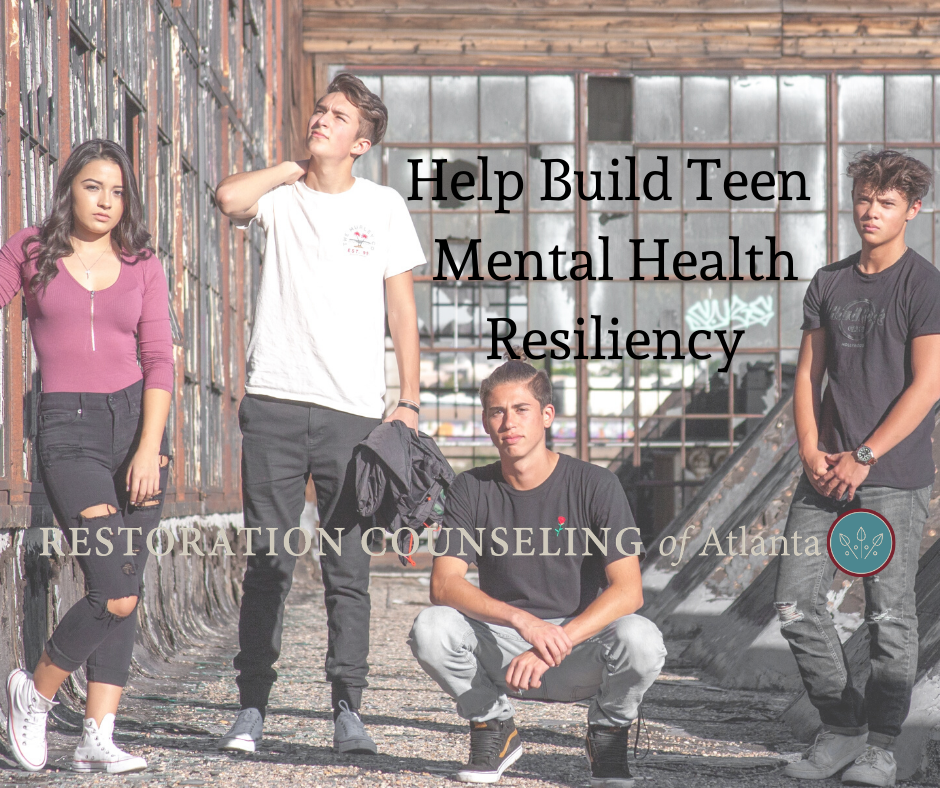We can help build teen mental health resiliency. Mental illness is on the rise around the world. One study found an increase of around 13% in affective disorders in children ages 0-14 (Salvi 2017). Technology growth and the heightened importance of social media and community involvement expose our teens to stressors that look different than those seen in previous generations.
Mental health counseling is evolving from the negative stigma of only being for “crazy people” or where you go when you have no other options. Today counseling is more often seen as a place to discover strengths, nurture positive emotions, reduce stress and anxiety, and help heal hurts. It is one of the principle ways to foster resilience, which is defined in much of the research literature as an adaptation to the adversities of life. Ann Masten (2015), states that resilience is ordinary, it happens every day, and can be acquired by anyone.
What is the teen experiencing?
The need for understanding, resources, and strategies to promote positive mental health has never been more in demand than now. It certainly needs to be addressed in the church. Awareness of developmental milestones is necessary to form a basis of typical behaviors to be expected at certain ages.
Is it serious?
Does the teen experience an elevated sense of worry with school, friendships, and activities? It should be no surprise to hear that a teen will face situations in life in which they become sad, detached, irritable, and at times, pessimistic. But what are the signs that there is a more serious issue? One sign is if patterns like the ones described are persistent (lasting for several weeks at a time). Another sign is disengagement from the general activities that previously produced joy, or if there is a new engagement in unfavorable activities. In these cases, it might be time to talk to an expert. Awareness is the first step toward change.
What does the Bible say?
The Apostle Paul had much to say about enduring hardship. For instance, 2 Cor. 4:17-18 states, “For this light momentary affliction is preparing for us an eternal weight of glory beyond all comparison, as we look not to the things that are seen but to the things that are unseen. For the things that are seen are transient, but the things that are unseen are eternal (ESV).” Here there is a theme that the things that cause discomfort do not last forever. Many times adolescents feel that what they are going through is the most catastrophic thing that could ever happen. However, we can be encouraged to endure by grasping hope of a future in which things get better.
Other passages that speak about resilience include Is. 40:31; Rom. 5:1-5; Phil 4:12; and Eph. 4:13. Paul urged the church community to attain unity of the faith, knowledge of the Son of God, mature personhood, and the full measure of the knowledge, love, and holiness of Jesus Christ. Age and developmental stages are important to consider since many people become believers in their late teen years (Dekker 2011). Does your church promote resilience in teens and participate in increasing positive mental health?
How can the church help?
Stand strong.
The prayer of Jesus in John 17 was not to remove the disciples (who were in their late teenage years) from the hardships of the world, but that they be kept from the evil one (v15). Attempting to remove the teen from the adverse situation will not promote resilience, but will produce dependence.
Model empathy.
Another helpful practice might be to sit and listen to teens. Exercise empathy by validating and normalizing their feelings. Paul encourages his readers to rejoice with those who rejoice and weep with those who weep. (See Rom. 12:9-21 for more thoughts on empathetic responses).
Offer counseling.
Teens are to be sanctified in God’s truth, which is the Word of God. One way churches can help is through youth groups. Those that incorporate counseling using God’s word can help teens develop an awareness and acceptance of feelings and emotions. These feelings are not wrong within themselves, yet unexamined they can cause behavioral and relational problems.
Purchase or produce materials based on Scripture.
1 Samuel 30 provides an example where David has returned to Ziklag. He finds his wife and children captured and his peers ready to stone him. This passage includes lessons on loss, trust, friendship, the believer’s response to authority, and turning to the Lord during a crisis.
Create a nurturing environment.
Adolescence is a time of self-discovery and identity formation. The church has the responsibility to create a nurturing environment. It should be a place where resilience can develop regularly in teens by setting the standard of empathy, gratitude, acceptance, grace, and forgiveness.
The fruit of the Spirit (Gal. 5) is love, joy, peace, patience, kindness, goodness, faithfulness, gentleness, self-control. This is the foundation to help teens grow and create a safe environment with each other. Integration of therapeutic techniques such as mindfulness, combined with prayer and reading scripture, can help regulate emotions. The Bible provides practical ways to do this such as renewing our minds and being transformed (Rom. 12:1).
How can I help?
Adults who have a heart for teenagers and want to help have several options.
Share your Testimony.
If you need help in the arena of mental health, sign up to get assistance. There is no greater witness than for you to relate to someone’s struggle than through shared experience. Adults can help foster resilience by sharing their testimonies of how God used the counseling experience to reveal hurts he desired to heal. This will encourage the teen to do the same. They can learn how to develop their own testimony by examining their life before Christ, sharing how they met Christ, and telling of the transformation that has taken place since developing a relationship with Christ.
Become a mentor.
By establishing meaningful life on life relationships, a teen can see an adult as more than someone who is merely trying to fix them, but someone who genuinely cares and accepts them. After building this type of relationship (which might take a long time), it will become easier to encourage the teen to endure the hardships of life, challenge the teen to make adjustments in certain areas and engage them to follow through on the commitment to Christ that they have or have yet to make.
Become a mental health counselor.
If you are led to do more to help teens you might want to look into the process of becoming a licensed counselor or life coach. By training and certification, you can be sure that you are accurately providing care for the teens in your church. Be sure that you count the costs of continuing education and state licensure.
Positive mental health begins with an awareness of what you are feeling and understanding that feelings alone are neither good nor bad. As believers, we have to be faithful stewards of our bodies, our minds, and our behaviors. Teens engaged in a church with involved, empathetic adults and peers will be more likely to overcome adversity. As a result, they will have more opportunities to develop mental health resiliency.
References
Masten, Ann. 2015. Ordinary Magic: Resilience in Development. New York: Guilford Press, 2015.
Dekker, Jim. 2011. Resilience, theology, and the edification of youth: are we missing a perspective. The Journal of Youth Ministry, 9(2), 67–89.
Salvi, Deepak. 2017. “Primary Prevention of Depression in Adolescents: An Introduction to New Approaches to Promote Resilience and Personal Growth.” Indian Journal of Positive Psychology 8, no. 3: 305–8. http://search.ebscohost.com.ezproxy.sbts.edu/login.aspx?direct=true&db=a9h&AN=126080973.
 by James E. Francis, Jr., EdD, APC
by James E. Francis, Jr., EdD, APC
Buckhead Location Only
james@restorationcounselingatl.com
James helps with issues such as anxiety, anger, depression, life transitions, resilience, and spiritual maturity. He believes that therapy should be clinically excellent and theologically accurate. He prioritizes the integration of Scripture with elements of psychology to operate a holistic growth model. James uses reflective prayer to help individuals align their beliefs with Scripture. He then walks beside them to promote step-by-step healing from the pain of the past. James’ goal is to hold individuals accountable through encouragement and empowerment by activating their drive toward spiritual maturity.

